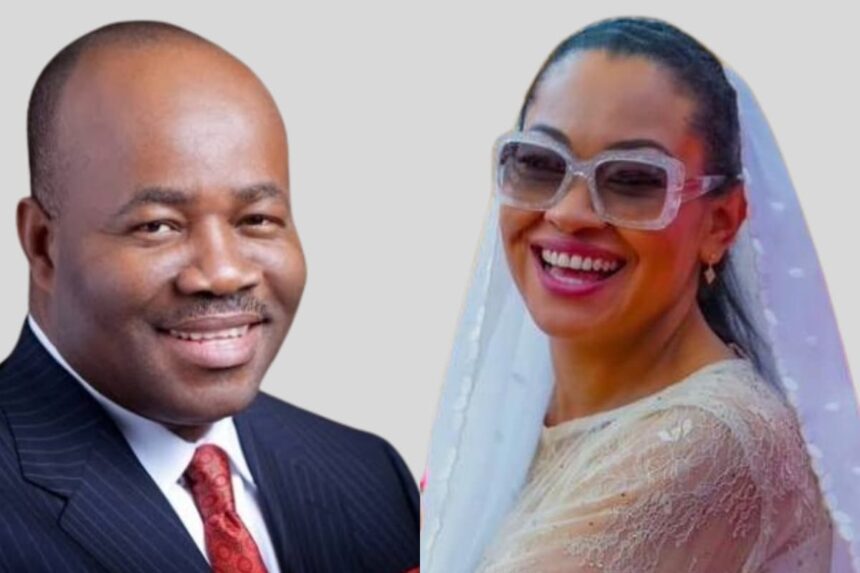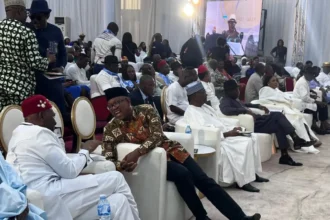Abuja, Nigeria – Senator Natasha Akpoti-Uduaghan has accused Senate President Godswill Akpabio of harassment and abuse of power, alleging that he sought personal favors in exchange for legislative support.
In a recent interview on Arise Tv, Akpoti-Uduaghan detailed how Akpabio repeatedly obstructed her motion to revive the Ajaokuta Steel Company by ensuring it was removed from the Senate’s order paper. When she confronted him regarding the delays, he allegedly insinuated that she could “enjoy a whole lot” if she complied with his wishes—an implication she found inappropriate.
The senator recounted that colleagues advised her to personally appeal to Akpabio to allow the motion’s presentation. However, when she sought his audience, he allegedly made suggestive remarks, stating, “The ball is in your court.” She left the meeting unsettled and later confided in her husband, though she refrained from disclosing full details. Her husband subsequently met Akpabio in London to discuss the motion, but Akpoti-Uduaghan was informed that the delays were intended to “protect” her.
She further alleged that her refusal to comply with Akpabio’s demands led to systematic victimization within the Senate. This included the deliberate reassignment of her seat to a less visible position in the chamber. Comparing her experience to female students who are unfairly penalized for rejecting inappropriate advances, she asserted, “That is what I have been going through.” She also suggested that senators who assumed office through court rulings rather than direct election results were being treated as second-class members of the chamber.
Akpoti-Uduaghan’s accusations have ignited widespread reactions, with growing calls for Akpabio to address the allegations. As of now, the Senate President has not issued an official response. If substantiated, the claims could pose serious ethical and legal concerns regarding power dynamics within Nigeria’s legislature. Civil society organizations and women’s rights advocates have urged the Senate to conduct a transparent investigation to ensure accountability and uphold institutional integrity.
The Nigerian political landscape has been rocked by a legal battle as Senator Natasha Akpoti-Uduaghan, representing Kogi Central, has filed a defamation lawsuit against Senate President Godswill Akpabio. The case, lodged at the Federal Capital Territory High Court, seeks N100 billion in damages over alleged defamatory statements made against her.
According to court filings, Akpoti-Uduaghan claims she was defamed by Akpabio and his Senior Legislative Aide, Mfon Patrick. She alleges that false and damaging statements were published, harming her political reputation and credibility.
The lawsuit follows her earlier claims that Akpabio sexually harassed her during a visit to his residence in Akwa Ibom. She asserts that her rejection of his advances resulted in retaliatory actions, including the reassignment of her Senate seat to a less prominent position. The lawsuit contends that the defamatory statements were a deliberate attempt to discredit her and undermine her standing in the political arena.
In response, the Senate leadership has rallied behind Akpabio, dismissing the allegations as unfounded. During a recent plenary session, several senators expressed confidence in his leadership and described the accusations as politically motivated. The controversy has intensified debates surrounding power dynamics, gender issues, and the treatment of women in Nigerian politics.
Legal experts and political analysts view the lawsuit as a crucial test of accountability and justice within Nigeria’s political framework. If the court rules in favor of Akpoti-Uduaghan, it could set a significant precedent for addressing defamation and harassment claims against high-ranking officials.
The case has drawn significant attention from advocacy groups, particularly those focused on women’s rights and political ethics. Many are calling for a thorough, impartial investigation into both the harassment allegations and the purported defamatory statements.
As legal proceedings unfold, Nigerians await further developments that could shape discussions on ethical conduct, legal recourse, and the role of accountability within the country’s governance system.


















